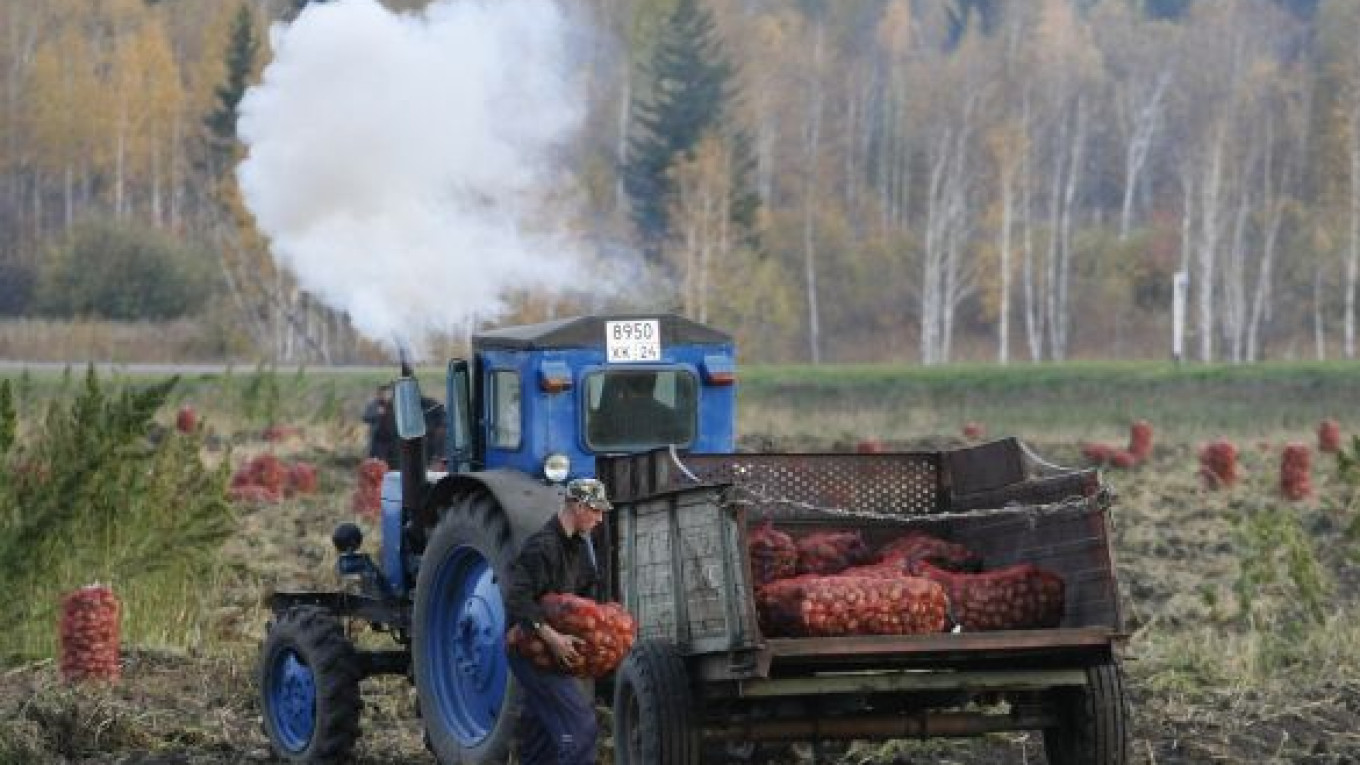Yielding to protracted pressure, President Vladimir Putin on Friday backed an additional fee on imported farm equipment in a move that could further irk the European Union.
In a conversation with an employee of farm equipment maker Rostselmash, Putin said it would be reasonable to charge a recycling fee on the equipment, just like on cars.
“I think it’s appropriate and possible,” he said at his Sochi residence. “This is right. It is only strange that it hasn’t already been done in practice.”
The recycling fee on cars, effective starting this month, largely offsets the cuts in automobile import duties, which took place as Russia entered the World Trade Organization last month.
It was only a week before Putin’s statement that European Trade Commissioner Karel De Gucht slammed Russia’s approach to the car recycling fee.
“Europe fully supports the basic environmental objective here,” he said in a Sept. 7 speech dedicated to the country’s accession to the WTO. “But we have grave concerns about the idea of levying fees on imported vehicles alone. This discriminates against European producers and clashes with the most basic WTO rules.”
In fact, domestic manufacturers of cars have to pay the fee as well, but they can instead guarantee that they will take care of their future clunkers — an option they overwhelmingly choose.
Putin’s support for the domestic farm equipment industry, represented chiefly by Rostselmash, came as a surprise given that the Economic Development Ministry and Industry and Trade Ministry had turned down the idea.
He spoke in favor of the fee at a meeting with Rostov region Governor Vasily Golubev and a few residents — who probably were carefully selected for the occasion — at his Bocharov Ruchei residence.
One of the guests, Rostselmash mechanic Valery Musiyenko, asked Putin to protect the company from foreign competition with a recycling fee. “We are on the verge of another crisis,” he said after recalling the global economic slowdown that hit Russia in 2008. “There’s another wave: joining the WTO.”
He also recollected that Putin visited the plant, reportedly the world’s fifth-largest producer of farm equipment, during the crisis.
“You tried our combine harvesters. You drove one of them. You made sure yourself that they were not worse than imported ones,” the mechanic said. “In many ways they are even better.”
After approving the recycling fee proposal, Putin said he would give the two ministries, which initially opposed the measure, one or two weeks to hammer out the details. He said the introduction of the fee wouldn’t run counter to the WTO’s free-trade rules.
The Economic Development Ministry said on Sept. 12 that it saw no reasons for the recycling fee to apply to farm equipment. The Industry and Trade Ministry concurred, according to materials released ahead of Economic Development Minister Andrei Belousov’s speech in the State Duma the same day.
The ministries refused to support a bill sponsored by United Russia Duma Deputy Vladimir Gutenyov that seeks to introduce the fee. He first registered the bill in the summer.
Konstantin Babkin, a co-owner of Rostselmash and a farm equipment company in Canada, didn’t answer phone calls Sunday afternoon. He said earlier this year that Western competitors had access to credit at much lower interest rates, and that the government had to level the playing field.
He led a campaign for most of the year to protest Russia’s entry into the WTO. Babkin was behind the moves to call a referendum and dispute the WTO membership in the Constitutional Court — both of which were unsuccessful.
The Association of Farm Equipment Producers, backed by Babkin, instigated an investigation by the Eurasian Economic Commission that focuses on the import of harvesters produced by such companies as John Deere and Case New Holland. The commission, a governing agency of the customs union of Russia, Belarus and Kazakhstan, announced the case in August.
In the same speech, De Gucht said the investigation gave the European Commission “serious doubts” about Russia’s commitment to free trade.
In a complaint that triggered the investigation, Rostselmash said the increase in the imports of competing products was suspiciously strong considering that they are more expensive. Foreign brands became a bit more affordable later in August, after Russia joined the WTO, because the import duty fell from 15 percent to 5 percent.
Related articles:
A Message from The Moscow Times:
Dear readers,
We are facing unprecedented challenges. Russia's Prosecutor General's Office has designated The Moscow Times as an "undesirable" organization, criminalizing our work and putting our staff at risk of prosecution. This follows our earlier unjust labeling as a "foreign agent."
These actions are direct attempts to silence independent journalism in Russia. The authorities claim our work "discredits the decisions of the Russian leadership." We see things differently: we strive to provide accurate, unbiased reporting on Russia.
We, the journalists of The Moscow Times, refuse to be silenced. But to continue our work, we need your help.
Your support, no matter how small, makes a world of difference. If you can, please support us monthly starting from just $2. It's quick to set up, and every contribution makes a significant impact.
By supporting The Moscow Times, you're defending open, independent journalism in the face of repression. Thank you for standing with us.
Remind me later.


